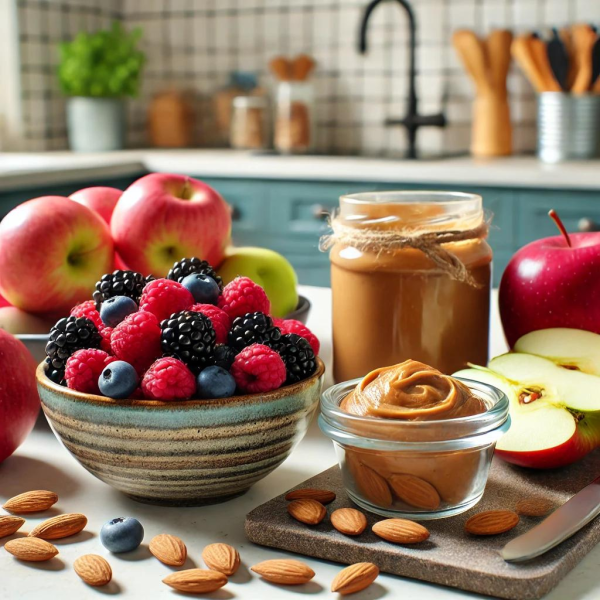Diabetic Diet for Beginners
Diabetic Diet for Beginners: A Comprehensive Guide to Healthy Eating

Introduction
Are you or a loved one newly diagnosed with diabetes and looking for guidance on dietary changes? Managing diabetes is crucial for maintaining your overall health and well-being. At Apollo Sugar Clinics, we specialize in providing comprehensive care and effective dietary strategies to help you live a healthy, balanced life. This blog post will introduce you to the basics of a diabetic diet, empowering you to make informed choices for better health.

Understanding Diabetes
What Is Diabetes?
Diabetes occurs when the body cannot effectively manage blood glucose levels, either due to insufficient insulin production or the body’s inability to use insulin properly. Insulin is a hormone that helps glucose enter the cells for energy. When this process is disrupted, glucose accumulates in the bloodstream, leading to high blood sugar levels. There are three main types of diabetes:
- Type 1 Diabetes: An autoimmune condition where the body attacks insulin-producing cells in the pancreas.
- Type 2 Diabetes: A condition where the body becomes resistant to insulin or doesn’t produce enough insulin.
- Gestational Diabetes: Diabetes that occurs during pregnancy and usually resolves after childbirth.
Importance of a Diabetic Diet
Following a diabetic diet is essential for maintaining stable blood sugar levels and preventing complications such as heart disease, nerve damage, and kidney issues. A well-balanced diet tailored to your specific needs can help manage diabetes effectively and improve overall health.
Key Principles of a Diabetic Diet
1. Focus on Low-Glycemic Index Foods
Foods with a low glycemic index (GI) are digested and absorbed more slowly, leading to a gradual rise in blood sugar levels. Examples include:
- Non-starchy vegetables: Broccoli, spinach, peppers
- Whole grains: Oats, quinoa, brown rice
- Legumes: Beans, lentils, chickpeas
2. Control Portion Sizes
Portion control is crucial in managing diabetes. Use measuring cups or a food scale to ensure appropriate serving sizes. A general guideline is to fill half your plate with non-starchy vegetables, one-quarter with lean protein, and one-quarter with whole grains.
3. Prioritize Fiber-Rich Foods
High-fiber foods help slow down the absorption of sugar, keeping blood glucose levels stable. Aim for 25-30 grams of fiber daily from sources such as:
- Fruits: Berries, apples, pears
- Vegetables: Carrots, leafy greens, Brussels sprouts
- Whole grains: Barley, oatmeal, whole wheat bread
4. Choose Healthy Fats
Incorporate unsaturated fats that support heart health and reduce inflammation. Examples include:
- Monounsaturated fats: Olive oil, avocado, nuts
- Polyunsaturated fats: Fatty fish like salmon, flaxseeds, walnuts
5. Limit Sugar and Refined Carbohydrates
Avoid foods that can cause spikes in blood sugar, such as:
- Sugary drinks: Soda, energy drinks, sweetened coffee
- Refined carbohydrates: White bread, pastries, sugary cereals
Meal Planning for Beginners
Breakfast Ideas
- Oatmeal with fresh berries and a sprinkle of chia seeds
- Whole-grain toast with avocado and a poached egg
- Greek yogurt with almonds and a drizzle of honey
Lunch Ideas
- Grilled chicken salad with mixed greens, cherry tomatoes, and olive oil vinaigrette
- Quinoa bowl with roasted vegetables and a dollop of hummus
- Whole-wheat wrap with turkey, spinach, and mustard
Dinner Ideas
- Baked salmon with steamed broccoli and brown rice
- Stir-fried tofu with bell peppers, snap peas, and quinoa
- Lean beef stir-fry with cauliflower rice and a side of spinach
Snacks for Blood Sugar Control
- Apple slices with almond butter
- Carrot sticks with hummus
- A handful of mixed nuts
Long-Term Management
Effective diabetes management involves more than just choosing the right foods. It also includes:
- Regular Exercise: Engage in at least 150 minutes of moderate exercise weekly.
- Monitoring Blood Sugar: Regularly check your blood sugar levels to understand how different foods affect you.
- Staying Hydrated: Drink plenty of water to help manage blood sugar levels and overall health.
- Avoiding Stress: Practice relaxation techniques like meditation, deep breathing, or yoga.
Our Approach to Diabetic Diet Management at Apollo Sugar Clinics
Comprehensive Assessment
During your initial visit, our experienced healthcare professionals will conduct a thorough assessment to understand your medical history, current health status, and specific needs. This may include blood tests, body composition analysis, and dietary evaluations.
Personalized Diet Plan
Based on your assessment, we will develop a personalized diabetic diet plan tailored to your unique needs. This plan may include specific food recommendations, meal timings, and portion sizes to help you achieve stable blood sugar levels.
Ongoing Support and Monitoring
We provide continuous support and monitoring to ensure your dietary plan is effective. Regular follow-up appointments and consultations help us track your progress, make necessary adjustments, and provide guidance to manage your diabetes effectively.
Why Choose Apollo Sugar Clinics?
- Expertise and Experience: Our team of skilled healthcare professionals specializes in diabetes management, ensuring you receive the best care possible.
- Patient-Centered Care: Your comfort and well-being are our top priorities. We strive to provide personalized care that addresses your specific needs and concerns.
- Advanced Technology: We use the latest medical technology and equipment to provide accurate diagnoses and effective treatments.
- Comprehensive Services: In addition to dietary management, we offer a wide range of diabetes care services to support your overall health.

BOOK YOUR APPOINTMENT TODAY!
If you or a loved one is looking to manage diabetes through a well-balanced diet, schedule a consultation with us at Apollo Sugar Clinics. Our friendly and knowledgeable staff is here to help you achieve stable blood sugar levels and improve your quality of life.
F.A.Q

A diabetic diet is a nutritional plan that helps people with diabetes manage their blood sugar levels. It focuses on balanced meals that include healthy carbohydrates, lean proteins, and healthy fats, along with fiber-rich foods. The goal is to keep blood sugar levels stable and reduce the risk of diabetes-related complications.
Yes, people with diabetes can eat carbohydrates, but they should focus on complex carbohydrates like whole grains, vegetables, and legumes. These are high in fiber and have a lower glycemic index, which helps prevent spikes in blood sugar levels. Portion control and monitoring carbohydrate intake are essential.
Yes, fruits can be included in a diabetic diet. Choose fruits with a low glycemic index, such as berries, apples, and pears, and eat them in moderation. Whole fruits are preferable to fruit juices because they contain more fiber and less concentrated sugar.
People with diabetes should avoid or limit foods high in added sugars, refined carbohydrates, and unhealthy fats. Examples include sugary beverages (like soda and sweetened coffee), sweets (like candy and pastries), white bread, and processed snacks. It’s also advisable to limit the intake of fried foods and foods high in trans fats.
It is generally recommended for people with diabetes to eat smaller, balanced meals and snacks throughout the day, approximately every 3-4 hours. This helps maintain stable blood sugar levels and prevents both hypoglycemia (low blood sugar) and hyperglycemia (high blood sugar).
